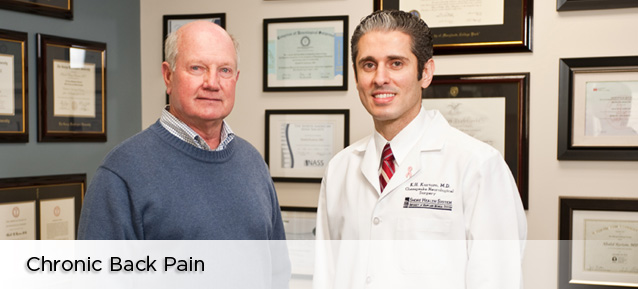Minimally Invasive Spine Surgery Helps Chronic Pain

Wayne Howard, a retired CEO of Choptank Community Health System, lived with severe chronic low back and leg pain for over 20 years.
Howard suffered from spinal stenosis — a degenerative disease that narrows the spinal canal and compresses the nerves in the lower back.
He tried different procedures, but nothing gave him relief.
"I tried many solutions to overcome or control my pain," Howard said, "including pain management clinics and prescription medicine. I had a series of injections in my back that eliminated the pain for about 8 or 9 months, but later injections didn't last as long."
He didn't want to try surgery because other physicians had told him that he might have only a 40-50% chance of eliminating the pain.
"The treatment of spinal stenosis is usually conservative at first, with medical and pain management in addition to physical therapy," said Khalid Kurtom, MD, FACS, neurosurgeon at University of Maryland Shore Regional Health. "Surgery is not offered until patients have failed all conservative management."
Successful Surgery and Active Lifestyle
For Howard, the surgery was a success. "I was amazed how quickly I was up and walking. I was moving around right after surgery." Howard's post-surgical treatment involved physical therapy to strengthen his core muscles. "My goal was to get through surgery and physical therapy and get back on the golf course."
Since his surgery, Howard has not needed painkillers, nor over-the-counter medication. He no longer limps and can stand up straight. And he is enjoying playing golf, walking and swimming again.
"I'm getting along fine," he told Dr. Kurtom, "but you didn't improve my golf game."
Dr. Kurtom recommends that all patients suffering from back or neck pain, shooting arm or leg pain or muscle weakness start with their primary care physicians.
"These physicians are trained to assess the overall condition, order the appropriate test to make the diagnosis and refer to neurosurgery as needed," he said. "Chronic pain is at times devastating, especially to people who enjoy being active."
Howard agrees. With no pain or after-effects from the surgery, he says, "I feel like I'm 10 years younger."
Care Close to Home
A native Eastern Shoreman, Howard values local health care. He praised Dr. Kurtom's team and the UM Shore Medical Center at Easton staff. "Having worked in the health care environment, I found that my experience with the whole Shore Regional Health team was positive. I value the local, personal touch that you get there."
For additional information about the services provided by the neurosurgery team at UM Shore Medical Group, call 410-820-9117.

